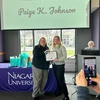Fredonia Department of Biology faculty member Dr. Courtney Wigdahl-Perry was recently contacted by international colleagues about conducting microplastics sampling on Chautauqua Lake, one of only a handful of North American sites to be included in a larger European study of microplastics in inland lakes.
A doctoral degree student from the Netherlands has been leading NETLAKE citizen science activities in Europe and is currently conducting a microplastics monitoring project assessing over 25 European lakes. Chautauqua Lake samples, one from the North basin and one from the South basin, have been collected and will be sent to the Netherlands for analysis.
Staff from the Chautauqua Lake & Watershed Management Alliance and the Chautauqua Watershed Conservancy, in coordination with Dr. Wigdahl-Perry, collected samples from both lake basins on Sept. 20. Erin Brickley, executive director of the alliance, stated “It is very exciting to be included in this international study which will serve to create baseline knowledge of microplastic levels in Chautauqua Lake. Chautauqua County was one of the leading municipalities that banned sales of cosmetic products containing microbeads which officially went into effect February 2016 so the timing of this study coincides nicely.” CWC Executive Director John Jablonski III noted, “there are simple actions each of us can take to reduce the likelihood of microplastics entering our waterways such as not littering, reduce bottled water consumption, avoid using plastic bags whenever possible, and buying products that contain natural exfoliants such as oatmeal or walnut husks rather than plastic microbeads.”
It was noted that much of the existing science on aquatic plastic pollution has focused on oceans, but is now evolving to include studies of freshwater ecosystems as well. Fredonia’s Dr. Sherri Mason of the Department of Geology and Environmental Sciences is on the forefront of freshwater studies focusing on the Great Lakes. During her studies, Dr. Mason found alarmingly high numbers of microplastics in the Great Lakes. The microplastics can act as a sponge for toxins and based on Dr. Mason’s findings, are entering into the food chain via ingestion by fish and other wildlife.
Citizen science is scientific research performed, partly or fully, by people not professionally trained as scientists while still applying sound scientific principles. For researchers, citizen science allows for scaling up of their project and informing a wider audience about their work. The Chautauqua Lake Association has participated for decades in the Citizens Statewide Lake Assessment Program (CSLAP), a volunteer lake monitoring program run by the N.Y.S. Department of Environmental Conservation (NYSDEC) and the N.Y.S. Federation of Lake Associations (NYSFOLA). The invaluable data includes parameters such as temperature, total Phosphorus, and algae levels and type. The NETLAKE study will be the first ever effort to assess levels of microplastics in Chautauqua Lake.
For more information regarding the microplastic sampling, contact Ms. Brickley at 716-661-8918.



